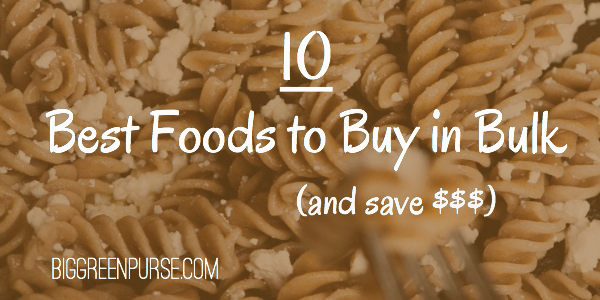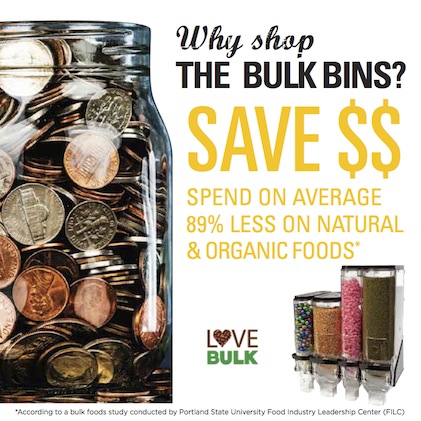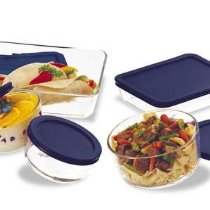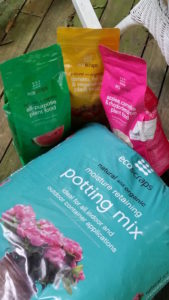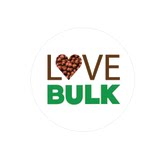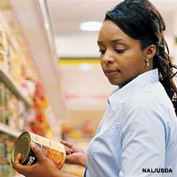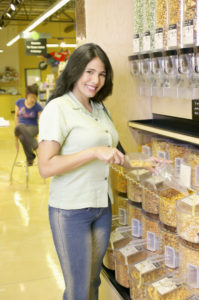One of the best ways to save money on food and reduce waste is to buy in bulk. But not all foods are equal when it comes to bulk buying. Some could spoil, others can take up valuable storage space, and still others you might never consume, whether you buy a little or a lot. Do you know the best foods to buy in bulk?
Why Buy in Bulk?
⇒ Buying in Bulk Saves Money – Pretty much all food costs less when you buy a larger size or choose from bins that allow you to package up your food yourself. See for yourself the next time you go shopping.
Compare the price of a pound of loose fresh carrots to a bag of peeled and washed baby carrots. The fresh carrots may cost one-third as much as the bagged ones. The same is true of packaged paper goods, like toilet tissue and paper towels. The more you buy, the less each one costs per unit price.
⇒ Bulk Foods Cut the Cost of Organic Groceries – Organic bulk foods on average cost 89% less than their packaged counterparts.
Compare the unit price of the foods you buy to find the best bulk deals. You can usually locate the unit price in the top left corner of the shelf label that gives the price for the product. Though you will pay less for the small size, you’ll probably pay more per unit price.
⇒ Bulk Foods Produce a Smaller Footprint on the Planet – Pre-packaged food comes wrapped in plastic, polystyrene, paper, and cardboard. All this wrapping takes its toll on the water and trees that are used to produce them. Plus, manufacturing all that packaging generates air and water pollution, along with climate-changing carbon dioxide that’s emitted when oil and coal are burned to produce paper and plastic.
It’s estimated that $1 out of every $11 we spend at the grocery store goes not to food, but to the throwaway packaging it comes in. That means, if you spend $100 on groceries, you’ve waste $11 on plastic and paper you just throwaway.
⇒ Bulk Foods Can Cut Waste – Buying in bulk allows you to buy just the amount of food you need so you’ll throw away less. It lets you stock up on items you might otherwise run out of frequently.
According to BulkIsGreen.org, 260 million pounds of foil packaging could be diverted from landfills per year if all Americans purchased coffee beans from the bulk bins.
⇒ Bulk Foods May Be Fresher – There’s often greater variety in the bulk bins than what you would find packaged on the shelves. And often, bulk food is fresher, as it has to be replenished more frequently than food that is packaged to have a long shelf life.
If you are buying packaged food, you can still buy in bulk by choosing the largest package you can consume in a reasonable amount of time. For example, buying one large bag of chips saves more money and creates less trash than buying a box of ten small bags of chips.
[box type=”tick” size=”large”]Don’t buy more than you think you’ll use over time. The point of buying in bulk isn’t to create more food waste, but rather to be smarter and more environmentally aware about the food you do buy.[/box][box]
 What Bulk Foods Will Save You The Most?
What Bulk Foods Will Save You The Most?
√ When buying in bulk, choose primarily foods that have a long shelf life (see our list below).
√ If you’re buying perishable foods like meat or chicken, buy in bulk when you can cook some and freeze the rest.
√ Planning to can fruits or vegetables? Buying them in bulk will save you a lot of money over buying them pre-bagged. [/box]
What About Storage?
Store bulk foods in air-tight containers at room temperature or slightly cooler, or in the freezer if appropriate. Unless you can see through the containers, label each one with the contents and date they were stored.
Need storage containers? The ones we offer in the Big Green Purse Amazon store will give you an idea of what to look for.
[box]
What Are the 10 Best Foods to Buy in Bulk?
› Dried Beans and Pasta – Dried pasta can last up to two years in a sealed container; dried beans can last about a year. Buy them either in large containers at warehouse clubs, or bag them yourself at your local grocery store or food co-op. Consider lentils, peas, garbanzo beans, black beans and navy beans, among others.
› Rice – White rice can last about a year; brown rice about six months. Store it in air-tight containers and use it until you need to replenish it. The idea isn’t to buy it and not use it!
› Pepper, Salt and Spices – Whole peppercorns can last as long as three years, though ground pepper only lasts about 6 months. Salt seems to last indefinitely. Spices vary; this handy guide from StillTasty.com lists expiration times for almost any spice you’ll have in your pantry.
› Snack Foods – A large bag of chips costs significantly less than individual bags packaged together, and generates a lot less waste. If you need snack sizes to take in your lunch or send with the kids to school, buy reusable snack boxes and refill those from the large bag.
› Popcorn – Popcorn kernels seem to last forever. Get the largest size you can find on the shelf, or buy in bulk by the pound. Popping your own popcorn is definitely cheaper than buying microwave popcorn, which comes in a serving bag as part of a box or package that’s additionally wrapped.
› Chicken – Large packages of chicken wings, legs, breasts and thighs are always cheaper than smaller servings. Buy the bulk size, then divvy up into smaller portions when you get home. Wrap in aluminum foil, then put into a reusable plastic freezer bag or other reusable storage container, along with the date. Use within 3 months.
› Meat – Like chicken, most meat is cheaper when you buy more of it. Buy large packages of steaks or chops, then divide into portions, wrap, date and freeze. Do the same with ground beef.
› Candy – Most hard candy has a long shelf life, especially if you keep it cool. Hard candy is better in bulk than chocolate.
› Condiments – Mustard, ketchup, and hot sauce usually have so much salt in them that you can buy the largest size you can use and not worry about it going bad. The same is true of relishes and pickles.
› Dried Fruit – Skip the little boxes of raisins in favor of a big bag or box; if you need snack-size servings, dole them out into small reusable containers or lunch bags. The same goes with dried apricots, cherries
› Toilet Paper and Paper Towels – These aren’t foods, of course, but they really make sense to buy in bulk. If you have the storage space, buy a 12-pack rather than a 4- or even 8-pack. [/box]
Buying in bulk can make organic food more affordable. See our post on the Top 10 Organic Food $$$$ Busters to learn more.
RELATED


